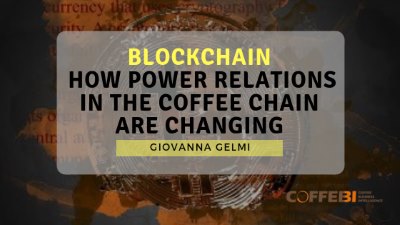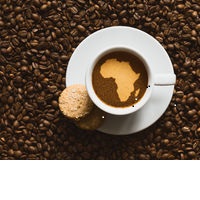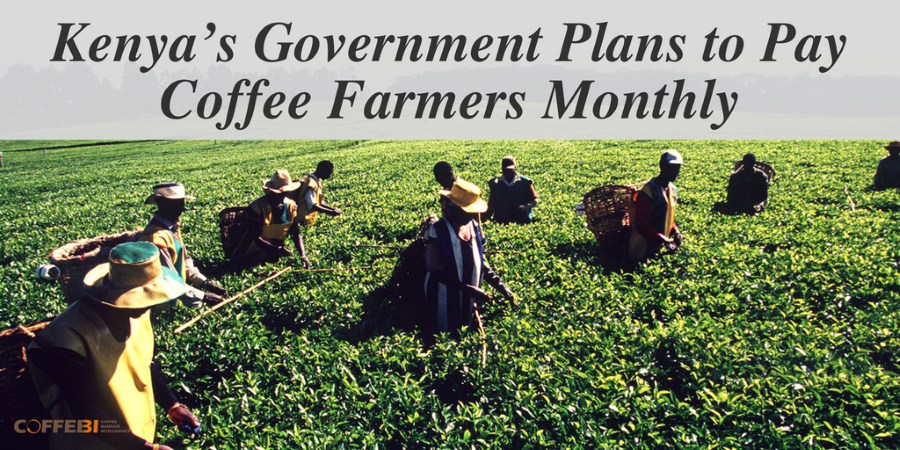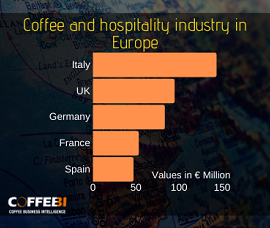Blockchain: How Power Relations in the Coffee Chain are Changing
 The coffee bean is one of the world’s most valuable agricultural products from the tropics: it’s worth over $100 billion worldwide. The coffee chain is characterized by a huge difference between production and consumption: on one side we have 25 million small farmers producing 80% of the world’s total coffee supply, for less than $2 a day, on the other side we have the “Big Four” coffee roasting companies – Kraft, P&G, Sara Lee and Nestle – buying about 50% of the coffee produced worldwide. This make the relation between buyers and producers in the coffee chain one of the most unfair of the world, for this reason improving sustainability in the coffee chain has been the goal of many different organizations and projects during the last few years. The technical aspects of the chain – traceability, management & control and chain configurations – affect sustainability, that is strongly linked to productivity and the use of agricultural inputs, particularly fertilizers and water. Many of the voluntary sustainability standards aim to improve productivity and the efficiency of input use. Final coffee consumers require the respect of basic standards such as a balance between payments, respect of farmers rights, environment and avoiding child labour.
The coffee bean is one of the world’s most valuable agricultural products from the tropics: it’s worth over $100 billion worldwide. The coffee chain is characterized by a huge difference between production and consumption: on one side we have 25 million small farmers producing 80% of the world’s total coffee supply, for less than $2 a day, on the other side we have the “Big Four” coffee roasting companies – Kraft, P&G, Sara Lee and Nestle – buying about 50% of the coffee produced worldwide. This make the relation between buyers and producers in the coffee chain one of the most unfair of the world, for this reason improving sustainability in the coffee chain has been the goal of many different organizations and projects during the last few years. The technical aspects of the chain – traceability, management & control and chain configurations – affect sustainability, that is strongly linked to productivity and the use of agricultural inputs, particularly fertilizers and water. Many of the voluntary sustainability standards aim to improve productivity and the efficiency of input use. Final coffee consumers require the respect of basic standards such as a balance between payments, respect of farmers rights, environment and avoiding child labour.
People’s willingness to pay more for good coffee is based on the idea of Daniel Jones, CEO of Bext360, a tech startup that wants to integrate new technologies with modern values. The firm builds big, sensor-laden machines to sort, weigh, and assess the quality of each coffee cherry plucked on a plantation. The devices analyze and grade the fruit based on its condition (riper, larger cherries generally fetch a higher price). The resulting data—weight, grade, and other specs—are made visible to buyers. Bext360 is strongly based on blockchains. This technology allows a coffee drinker in Denver to have access to this data and verify that the single-origin coffee the cafe sold to him/her is exactly that.
But the story begins far away in Africa…
To launch a pilot program using the bextmachine to trace coffee from Uganda to Denver, Colorado in the US, Bext360 will have two partners: the Great Lakes Coffee (Uganda-based coffee exporter) and Coda Coffee (Denver-based coffee roaster).
The bextmachine uses machine learning, artificial intelligence and IoT to evaluate coffee cherries and beans and grades cherry and bean quality. The machine employs blockchain technology from Stellar.org to track data about the coffee’s origin and quality and allows for digital payments to farmers via a mobile app. The bext360 platform enables all stakeholders – farmers, roasters, and consumers – to access data across the entirety of the supply chain. This is the best way for farmers to be paid not only for quantity but most of all on the quality of their beans. All of this coffee information—from providence to purchasers to payouts—are recorded on a blockchain in Bext’s system. “The blockchain is an incorruptible digital ledger of economic transactions that can be programmed to record not just financial transactions but virtually everything of value” (Source: Blockchain Revolution, authors Don and Alex Tapscott). Also, through the partnership with Moyee Coffee, the world’s first FairChain coffee brand based in Ethiopia and Amsterdam, Bext360 aims to launch a full-scale production and revenue-generating program, so that it will be able to bring more transparency to the coffee supply chain and more equity to these farmers.
Tracing coffee from Ethiopia to Amsterdam and payments back to Ethiopian farmers with the bext-to-brew platform.
Moyee will be the first European coffee brand to introduce fully blockchain-traceable coffee. All of Moyee’s coffee will be fully blockchain-traceable from the washing station in Ethiopia to its retail and wholesale customers in Europe. At the point of collection, the bext360 platform instantaneously creates crypto tokens, which represent the value of the commodity. As the commodity flows through the entire supply chain, new tokens are automatically created to represent the commodity in its developed form. For example, when a coffee cherry enters the supply chain, a token will be created to represent its quality at the first level. As it continues through its lifecycle in the supply chain and becomes green coffee, a new token will be created at each node of the supply chain and will be exchanged with the older token, in order to represent the commodity in its new form. The possibility to check the creation of value along the chain allows the creation of a new certification process: clearer and less expensive. Controls during the actual production processes require an inspector, who physically examines the product and ensures that the product is what it says it is, at each point of the supply chain.
Blockchain represents the possibility to create a real FairChain coffee and seems to be a big step forward in the process started with the first Eco and Fair Trade certifications. Will actual inspectors disappear and many people lose their jobs? Of course physical and chemical analysis along the chain will be integrated in every block of the tech chain and will improve the blockchain system. Will the battle between “Fair” Trade and “Normal” trade lose its meaning? If this technology is implemented, farmers will receive better payment and consumers will have a clear idea how value is added to a coffee bean along the chain. Smart technology is now used to benefit the men and women who produce coffee. This means we are in the beginning of a new era.



